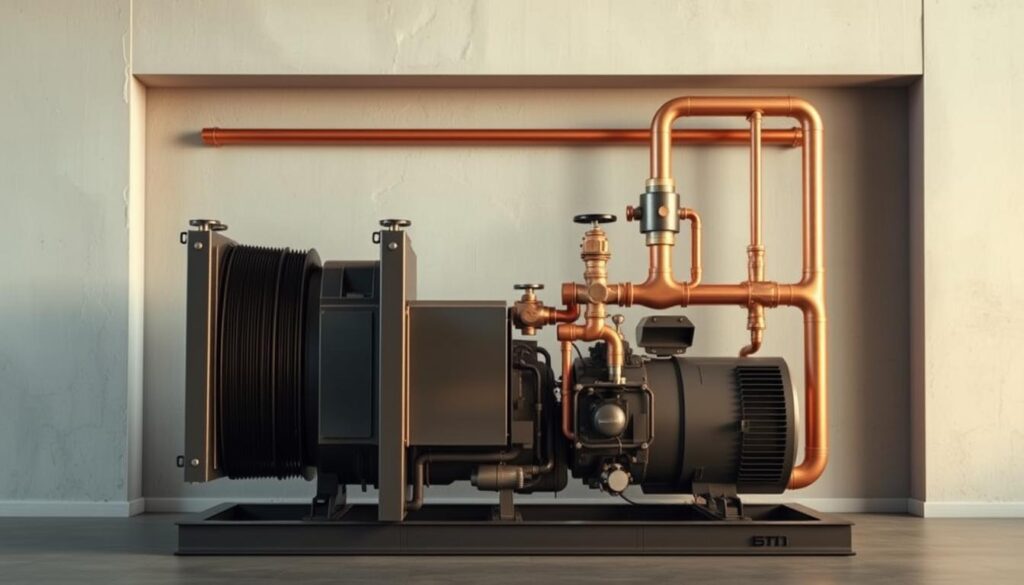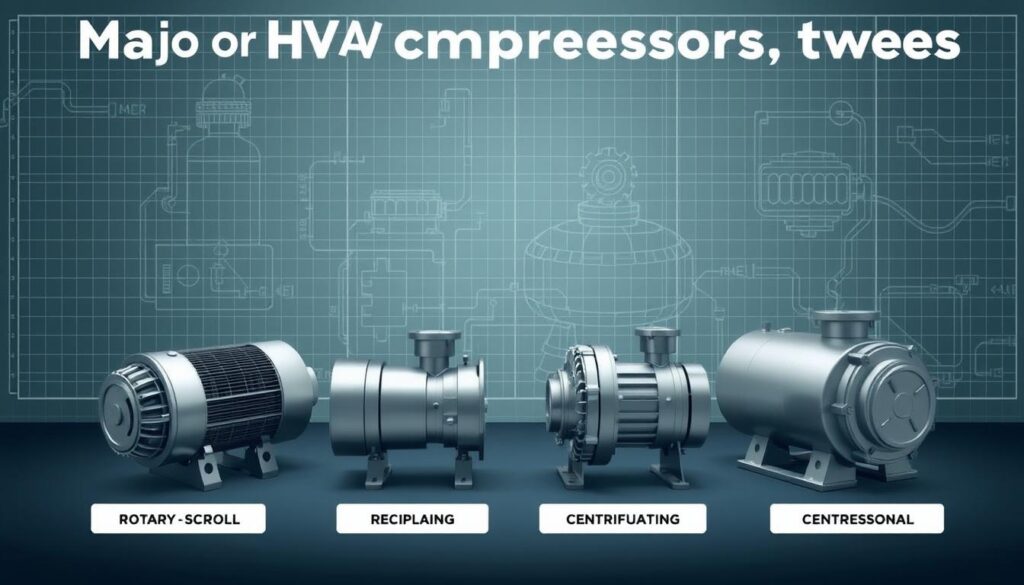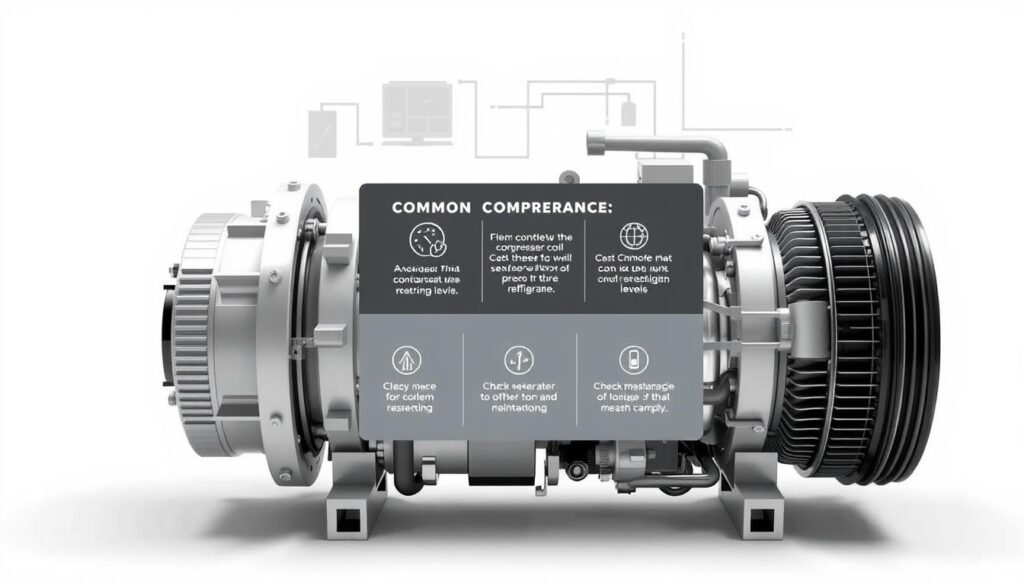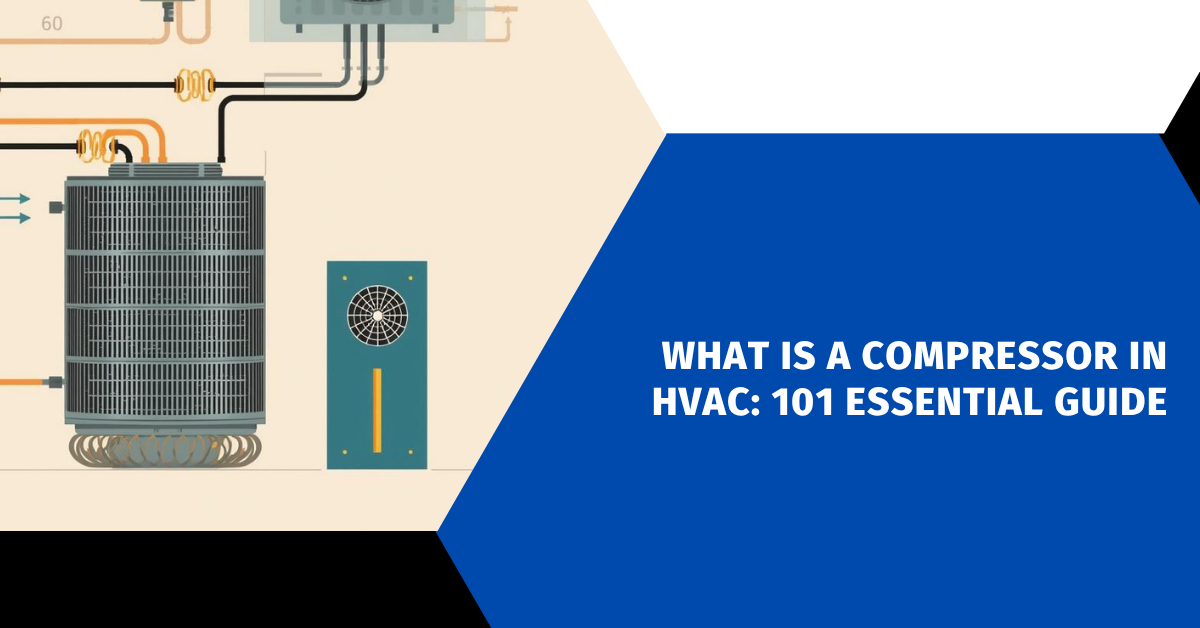Affiliate Disclosure
HVAC Guide Guys is a participant in the Amazon Services LLC Associates Program, an affiliate advertising program designed to provide a means for sites to earn advertising fees by advertising and linking to Amazon.
What Is A Compressor In HVAC? Ever wondered how your home stays cool on hot summer days? The HVAC compressor is the key to your comfort. It’s the heart of any air conditioning system.

A compressor in HVAC is more than a simple part. It’s the engine that turns warm air into cool air. Knowing how it works helps you see the amazing tech that keeps you comfortable.
These devices are vital for cooling and controlling temperature. They compress refrigerant and move it through your system. This is how air conditioning works its magic.
Key Takeaways
- HVAC compressors are essential for temperature control
- They convert warm air into cool, comfortable environments
- Compressors work by compressing and circulating refrigerant
- Understanding their function helps maintain system efficiency
- Different types of compressors suit various cooling needs
Table of Contents
Understanding HVAC Compressor Fundamentals
An HVAC compressor is the heart of any air conditioning system. Knowing how it works can help you understand how cooling technology changes indoor spaces. The compressor refrigeration cycle is a complex process that moves heat and makes spaces comfortable.
Exploring different AC compressors shows amazing engineering for precise temperature control. These machines work hard to keep indoor conditions comfortable.
Basic Operating Principles
The compressor does three main things:
- Absorbing low-pressure refrigerant
- Compressing the refrigerant to increase temperature and pressure
- Pushing heated refrigerant through the system
Role in Refrigeration Cycle
“The compressor transforms refrigerant from a low-pressure gas to a high-pressure, high-temperature state, enabling heat transfer.” – HVAC Engineering Insights
Your AC’s compressor drives the refrigeration cycle by creating pressure differences. This allows refrigerant to absorb indoor heat and release it outside, cooling the space.
Core Components Overview
Understanding a compressor’s design shows its complexity. Key parts include:
- Electric motor
- Compression mechanism
- Refrigerant intake and discharge valves
- Lubrication system
Each part is vital for changing refrigerant and keeping the cycle efficient.
What Is A Compressor In HVAC
A compressor is the heart of your air conditioning system. It’s a key part that cools your indoor spaces. It manages refrigerant flow and heat transfer.
Understanding the compressor’s role helps you see how it makes your space comfortable. It turns warm air into cool air.
The compressor’s job is to compress refrigerant gas. This makes its pressure and temperature go up. Then, it moves through the system, taking heat from indoor air and releasing it outside.
- Converts low-pressure refrigerant into high-pressure gas
- Drives the refrigeration cycle
- Enables heat exchange between indoor and outdoor environments
“The compressor is the pump that keeps your cooling system running efficiently.” – HVAC Engineering Experts
There are different types of HVAC compressors. Each has its own features:
- Reciprocating compressors
- Scroll compressors
- Rotary compressors
- Centrifugal compressors
Your HVAC system’s performance depends on the compressor. Choosing the right one means better cooling, energy savings, and reliability.
Explore Our HVAC Shop
Looking for top-rated HVAC tools, parts, and accessories? Visit our shop and find the perfect solution for your needs.
Visit the ShopThe Critical Functions of HVAC Compressors
HVAC compressors are key to keeping your home cool. They play a big role in making your indoor temperature comfortable. Knowing how they work helps you understand your home’s climate control better.
A compressor has three main jobs in the refrigeration cycle. These jobs help move heat and control temperature.
Heat Transfer Process
The compressor changes low-pressure refrigerant gas into high-pressure, high-temperature gas. This change is key for moving heat from inside to outside. The compressor cycle makes this heat exchange happen through specific physical changes.
- Converts low-pressure refrigerant to high-pressure gas
- Raises refrigerant temperature
- Prepares refrigerant for heat release
Pressure Regulation
Pressure control is another important job of HVAC compressors. They manage refrigerant pressure for efficient heat transfer and cooling. The compressor keeps the right pressure differences for the refrigerant to absorb and release heat well.
Refrigerant Circulation
Refrigerant circulation is essential for cooling your space. The compressor drives this circulation. It moves refrigerant through changes, absorbing indoor heat and releasing it outside. This keeps your home cool and comfy.
The compressor transforms refrigerant from a low-pressure gas to a high-pressure, high-temperature gas, enabling efficient heat transfer.
Major Types of HVAC Compressors
Knowing the different types of ac compressors is key to picking the best for your home. Each type has its own strengths and how it works in HVAC systems.

Today’s HVAC systems use several compressor technologies. These help manage cooling and heating well. The main types are:
- Reciprocating Compressors
- Scroll Compressors
- Rotary Compressors
- Centrifugal Compressors
Home air conditioner compressors have special designs that affect their performance. Let’s look at the main ac compressor types and where they’re best used:
| Compressor Type | Key Characteristics | Best Applications |
|---|---|---|
| Reciprocating | Piston-driven, high reliability | Small to medium residential systems |
| Scroll | Spiral design, quiet operation | Modern residential and light commercial units |
| Rotary | Compact, efficient rotation | Space-constrained installations |
| Centrifugal | High-capacity, large-scale cooling | Commercial and industrial systems |
Selecting the right compressor depends on your specific cooling requirements and system design.
Each compressor type has its own benefits for different cooling needs. Knowing their features helps you choose the best for your HVAC system’s performance and efficiency.
Explore Our HVAC Shop
Looking for top-rated HVAC tools, parts, and accessories? Visit our shop and find the perfect solution for your needs.
Visit the ShopRotary and Reciprocating Compressors Explained
When looking at AC compressors, knowing the difference between rotary and reciprocating is key. These two types are the main ways to cool your home. Choosing the right one is important for your cooling system’s performance.
Home HVAC systems need special compressors to cool efficiently. Each type has its own strengths that affect how well the system works.
Design Differences
Rotary and reciprocating compressors are built differently:
- Rotary compressors use rotating vane mechanisms
- Reciprocating compressors use piston-driven compression
- Rotary units are more compact
- Reciprocating models have a more traditional design
Performance Characteristics
These compressors have different performance features:
- Rotary compressors are quiet
- Reciprocating models are durable
- Rotary units are efficient
- Reciprocating compressors handle pressure well
Application Scenarios
The right compressor depends on your cooling needs:
- Rotary compressors are great for small homes
- Reciprocating models work well in bigger spaces
- Commercial places often use rotary technology
- Big residential needs are better with reciprocating designs
Knowing these differences helps both homeowners and HVAC experts choose the best compressor for their homes.
Scroll and Screw Compressor Technology
Scroll and screw compressors are key innovations in commercial HVAC. They’ve changed how heating and cooling work in big places.
Scroll compressors have a special design. Their spiral shape allows for smooth compression. This makes them quiet and efficient.
- Minimal mechanical friction
- High energy efficiency
- Compact design
- Reduced operational noise
Screw compressors are great for big HVAC systems. They can handle lots of refrigerant and are very reliable. Their rotors work together to compress refrigerant well.
Key advantages of screw compressors include:
- Superior performance in large-scale applications
- Enhanced durability
- Excellent heat transfer capabilities
- Consistent operational efficiency
Choosing between scroll and screw compressors depends on your HVAC needs. Each has its own benefits for different situations.
Mini Compressors and Modern Innovations
The world of air conditioner compressors has changed a lot with new mini technologies. Now, HVAC systems use small, energy-saving compressors. These changes improve cooling and save space.
RIGID’s Technological Breakthrough
RIGID Technology is leading in mini refrigeration. They’ve made energy-saving compressors that are small but powerful. These compressors work great and take up little space.
- Miniaturized design for versatile applications
- Advanced cooling technology
- Enhanced energy efficiency
Compact Design Advantages
Compact compressors bring big benefits for homes. They fit in tight spaces, making them perfect for small homes.
| Design Feature | Benefit |
|---|---|
| Reduced Size | More installation flexibility |
| Lightweight Construction | Easier maintenance |
| Precision Engineering | Improved cooling efficiency |
Energy Efficiency Innovations
Today’s mini compressors are amazing at saving energy. They use less power but cool just as well. This helps cut down on electricity bills and is better for the planet.
The future of HVAC technology lies in compact, intelligent cooling solutions that prioritize both performance and sustainability.
Maintenance and Troubleshooting Essentials
Keeping your HVAC system in top shape is key. Regular maintenance helps your compressor last longer and work better all year. It also saves you from expensive repairs.

Watch for warning signs when your hvac compressor acts up. These signs can help you fix problems before they get worse.
- Listen for unusual noises like grinding, clicking, or rattling
- Check for reduced cooling efficiency
- Inspect for visible refrigerant leaks
- Monitor electrical connections for signs of wear
Both DIY tasks and professional checks are part of a good maintenance plan. Here’s how to keep your HVAC compressor running smoothly:
| Maintenance Task | Frequency | Purpose |
|---|---|---|
| Clean air filters | Every 1-3 months | Prevent system strain |
| Professional inspection | Annually | Comprehensive system check |
| Clear surrounding area | Seasonally | Ensure proper airflow |
Warning signs that require immediate professional attention include:
- Persistent tripping of circuit breakers
- Complete system shutdown
- Frost buildup on refrigerant lines
- Significant drop in cooling performance
While you can do some maintenance yourself, complex tasks need a pro. HVAC experts can spot and fix problems you might miss.
Explore Our HVAC Shop
Looking for top-rated HVAC tools, parts, and accessories? Visit our shop and find the perfect solution for your needs.
Visit the ShopEnergy Efficiency and Performance Metrics
It’s key to know about energy efficient compressors to boost your HVAC system’s performance. This also helps cut down on utility bills. The role of the hvac compressor is vital for system efficiency and how it affects the environment.
Today’s energy efficient compressors bring big benefits for homeowners. They use less energy and keep your home cool just right.
- Seasonal Energy Efficiency Ratio (SEER) gives a full picture of cooling efficiency
- Variable speed compressors adjust to temperature changes
- Modern tech cuts energy use by up to 40%
When looking at hvac compressor function, focus on these important metrics:
| Metric | Impact | Energy Savings |
|---|---|---|
| SEER Rating | Cooling Efficiency | 15-25% |
| Variable Speed | Precise Temperature Control | 30-40% |
| Inverter Technology | Consistent Performance | 20-35% |
Choosing an energy efficient compressor can change your home’s cooling system. Invest in advanced technologies for better performance and less environmental harm.
Conclusion
Knowing what a compressor in HVAC is is more than just tech talk. It’s about seeing the core of cooling and heating systems. The quality and design of the compressor are key to how well your HVAC system works.
The world of AC compressors is always changing. New tech from leaders like RIGID Technology is making them smaller and more energy-saving. Now, even small systems are super efficient and reliable for homes and businesses.
When picking an HVAC system, it’s important to know about compressors. You need to understand their role, how they perform, and how to keep them running well. The future of HVAC looks bright, with systems that save energy and work better.
Learning about compressors helps you choose the best cooling and heating systems. Each type, like rotary or scroll, has its own perks. They can make your space more comfortable and cut down on energy bills. Keep up with new tech, get regular maintenance, and enjoy the latest in HVAC compressor advancements.

